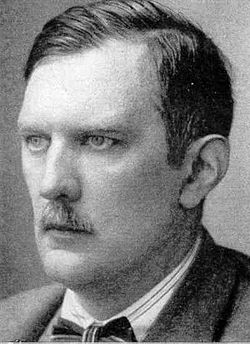 Moeller van den Bruck gilt heute als einer der maßgeblichen Köpfe der Konservativen Revolution. Viele Identitäre berufen sich, neben der Neuen Rechte, auch auf diese Strömung, was Moeller ins Zentrum des Interesses rücken sollte. Einem breiteren Publikum ist er heute nur durch seine Schrift „Das dritte Reich“ bekannt, die (mit und über Dietrich Eckhart) titelgebend für das NS-Reich werden sollte. Doch damit tut man ihm Unrecht! Moeller war und ist viel mehr als nur „Stichwortgeber“ für den NS. In ihm, seinem Denken und Werdegang zeichnet sich hingegen die große Tragödie um die konservativ-revolutionären „Denker“ und die national-sozialistischen „Macher“ so deutlich ab, das wir auch heute noch viel daraus lernen können.
Moeller van den Bruck gilt heute als einer der maßgeblichen Köpfe der Konservativen Revolution. Viele Identitäre berufen sich, neben der Neuen Rechte, auch auf diese Strömung, was Moeller ins Zentrum des Interesses rücken sollte. Einem breiteren Publikum ist er heute nur durch seine Schrift „Das dritte Reich“ bekannt, die (mit und über Dietrich Eckhart) titelgebend für das NS-Reich werden sollte. Doch damit tut man ihm Unrecht! Moeller war und ist viel mehr als nur „Stichwortgeber“ für den NS. In ihm, seinem Denken und Werdegang zeichnet sich hingegen die große Tragödie um die konservativ-revolutionären „Denker“ und die national-sozialistischen „Macher“ so deutlich ab, das wir auch heute noch viel daraus lernen können.
Dandy und Dissident
Um Moeller als Person nebelt heute die Aura des Erhabenen und Geheimnisvollen. Seine Zitate, seine Bilder, seine Begriffe ließen ihn für meine Phantasie immer zu einer Gestalt werden, die wie George über dem Getöse der Weimarer Dekadenz schwebte. Mitnichten! Ich war durchaus überrascht, als ich erfuhr, dass er sich mittendrin befunden hatte. Moeller war ein Dandy, chronisch pleite und Dauergast in diversen Bohemien-Kreisen. Überhastete Reisen, oft auf der Flucht von Gläubigern prägten sein zerfahrenes Leben, dem er auch mit 49 Jahren ein Ende setzte. Nichts von all dem deutet auf einen Charakter hin, der in der Lage war, gegen die Dekadenz der Weimarer Zeit anzuschreiben, und gegen Nihilismus und Beliebigkeit die Ideen von Stil, Einheit, Genesung und Stärke zu predigen. Doch van den Bruck war mit der Zeitschrift „Das Gewissen“ und seinen Buchveröffentlichungen einer der maßgeblichsten Denker der Konservativen Revolution.
Konservative Revolte gegen den Liberalismus
Heute ist Moeller van den Bruck vor allem über das Zitat: „Am Liberalismus gehen die Völker zugrunde“, bekannt. Das ist kein schlechter Umstand, da in diesem Satz vieles von seinem Denken zusammengefasst ist. Moeller sah in der Tat den herrschenden bürgerlichen Geist, den saturierten Pazifismus, die Gleichgültigkeit gegenüber jedem höheren Wert, den kaufmännischen Mensch und sein Projekt vom befriedeten Weltmarkt als schlimmsten Gegner, den er mit „Liberalismus“ als „Ausdruck einer egoistischen und individualistischen Lebensauffassung benannte. Er zersetzt alle gewachsenen Gemeinschaften und untergräbt jedes Ideal, das über den eigenen Körper und „das Lüstchen für den Tag und sein Lüstchen für die Nacht“ (Nietzsche).Und: „Er schaltet das Volk aus und setzt ein Ich an die Stelle“
Mehr noch als den Marxismus, den er teilweise als berechtigten Aufschrei gegen die Herrschaft des Geldes betrachtete, kämpfte er gegen das System. Die Kommunisten nannte er „querköpfige toll gewordene“ Deutsche. Prophetisch erkannte er, vor den nationalbolschewistischen Zersplitterungen aller „Internationalen“, dass „jedes Volk seinen eigenen Sozialismus“ hat. Zeitlebens hoffte er auf eine Vereinigung des ganzen Volkes gegen jede Klassenspaltung. Eine Vereinigung, die den Hauptfeind bekämpfen sollte. Es war die neue Gattung an „letzten Menschen“, Blooms, die heute so stark wuchern wie nie zuvor:
„Sie fühlen sich als Einzelwesen, die Niemandem verpflichtet sind, und am wenigsten dem Volke. An seiner Geschichte sind sie völlig unbeteiligt. Sie teilen nicht seine Überlieferung. Sie haben kein Miterlebnis seiner Vergangenheit. Sie haben auch nicht den Ehrgeiz seiner Zukunft. Sie suchen nur die Vorteile ihrer eigenen Gegenwart. Ihr letzter Gedanke ist auf die große Internationale gerichtet.“
Diese Internationale bedeutete damals wie heute das Ende aller Völker und Kulturen, aller Vielfalt und Freiheit – kurz: all dessen, was den Menschen ausmacht. (Es macht ihn eben aus, dass es ihn „an sich“ nicht gibt.) Gegen diesen Liberalismus kämpfte Moeller van den Bruck mit revolutionärer Kraft. Er verlachte impotente, alte Konservative, die sich zaghaft an tote Hüllen klammerten und mit arrogantem Elitismus die Arbeiter den Marxisten zutrieben. Der „Altkonservativismus“ hatte sich „auf seine Klitsche zurückgezogen und den Sinn für die Probleme der Zeit verloren.“
Zwar war er klar für Elite und den hierarchischen Staat, doch dieser sollte organisch sein und über die „Kraft in Gegensätzen zu leben“ verfügen. Anders als viele liberal gesinnte Konservative sah er die revolutionären Unruhen nicht nur als Gefahr und Bedrohung, sondern vielmehr als Fieber, dem eine Gesundung folgen könnte. Als klassischer Vertreter eines dritten Weges (Ursprünglich wollte er sein opus magnum „Die dritte Partei“ nennen) lehnte er sowohl Marxismus als auch Liberalismus ab und wollte mit der Neuerweckung ewiger Werte, eine große Einheit wiederherstellen.
Van den Bruck und die 3PT
Als 3.PT (3. politische Theorie) bezeichnen wir Identitäre in der Regel die Gesamtheit der nationalistischen, antiliberalen und antimarxistischen Strömungen des 20. Jahrhunderts, die häufig (und vereinfachend) als „Faschismus“ pauschalisiert werden. Insbesondere meinen wir damit den deutschen National-Sozialismus und den konkreten italienischen Faschismus.
Vieles von dem Gesagten und zitierten deutet daraufhin, dass Moeller ein Denker und Wegbereiter dieser 3.PT gewesen ist. Doch er stand dem italienischen Faschismus, den er noch miterlebte, durchaus kritisch gegenüber (obwohl er in ihm einen vielversprechenden Aufbruch für Italien und NUR Italien sah). Vor allem dessen Etatismus (Verabsolutierung des Staates), auf den er Mussolinis Südtirolpolitik zurückführte, erregte seine Ablehnung. Sein Tod 1925 verhinderte jede zeitgenössische Betrachtung des Nazi-Reichs, doch persönliche Kommentare über die Frühphase der Bewegung zeigen eher Ablehnung.
In Hitler sah er einen Menschen „ganz ohne Abstand und Augenmaß“. einen „Fanatiker“ und „Eiferer“. Auch im NS gab es abgesehen von dem erfolgreichen Versuch, den bekannten Autor für das eigene Reich zu reklamieren, wenige bis gar keine Bezüge auf sein Werk. 1939 erschien dann eine Dissertation eines Helmut Rödels, der, stellvertretend für die NSDAP, eine klare Distanzierung zu van den Bruck aussprach. Er sei „kein Seher und Künder des dritten Reichs im Sinne des NS.“
Er wurde als konservativer, esoterischer Traumtänzer abgelehnt, der im Gegensatz zum rein wissenschaftlichen, pragmatischen NS stehe, der nur die Naturgesetze vollziehe. Vor allem Moellers klares Bekenntnis, wonach „die Rassenanschauung (…) sich in unlösbare Widersprüche verstrickt, wenn sie Rasse nur in dem biologischen Sinne begreift“, war für die „naturwissenschaftliche“ Rassenlehre und -züchtung des NS ein Affront.
Moeller und der NS
Insgesamt war Moeller ein erklärter Gegner jedes Totalitarismus und jeder reinen Machtpragmatik. Ihm ging es um das große Erbe der deutschen und europäischen Traditionen und um den entschiedenen Kampf gegen die Entzauberung, Vermassung, Vereinheitlichung und Verflachung der Welt. Die oberflächliche Demagogie war ihm, ebenso wie rein pragmatische Machtpolitik, verhasst. Dennoch war er aber kein abgehobener „Schöngeist“, sondern stand mehr als andere für das „Revolutionäre“ in der Konservativen Revolution. Er wollte das Volk begeistern und mitreißen, wollte das Fieber sogar steigern, um zu einer Gesundung zu führen. Er wollte aktiv Einfluss auf die Politik nehmen und kritisierte die Konservativen scharf für ihr apolitisches, verspieltes Sektierertum. Seine Ablehnung am NS war also, anders als bei vielen anderen Denkern nicht einem letztlich verächtlichen Standesdünkel gegen „den Pöbel“ geschuldet. Er wollte ja gerade die revolutionären Kräfte aus der Arbeiterschaft in den Dienst einer großen spontanen Regeneration stellen! Er lehnte den NS aufgrund seiner Ideologie ab, die für Moellers stilvolle und erhabene Gedankenwelt, als plumper materialistischer Rassenkult erscheinen musste. Vor allem aber sah Moeller im kommenden Erwachen des „jungen“ deutschen Volkes eine Revolte gegen den Westen, und die liberale, atlantische Welt. Er sah Russland damals schon als Teil Europas und hoffte auf eine Überwindung und „Russifizierung“ des dortigen Marxismus zu einem ethnischen und kulturell entschärften Sozialismus (was ja nach dem 2. Weltkrieg auch peu à peu geschah)
Moellers Denken, das er mit anderen Gleichgesinnten wie vor allem Niekisch und Hielscher teilte, richtete sich also scharf gegen den Zivilisationschauvinismus des NS. Dieser war stark auf England und Amerika fixiert. Adolf Hitler selbst bewunderte das englische Kolonialreich und wollte es sogar im Sinne einer universalistischen Ideologie vom Arier als „Prometheus der Menschheit“ für die weiße Rasse „retten“. In diesem Lichte erscheint die NS-Idee als Auffassung von Herkunft und Rasse einmal mehr als Fortführung des Chauvinismus und Rassismus aus der englischen Kolonialzeit, indem am westlich-fortschrittlichen Wesen, „die Welt genesen“ sollte.
Moellers Idee von Kultur und Ethnos war eine andere, die ganz klar pluralistisch gerichtet war. Konservativ bedeutete für ihn vor allem „ die Fähigkeit, immer mehr von dem, was in uns ewig ist, freizulegen.“ Die Konservative Revolution ist daher keine universalistische Ideologie, sondern der Aufruf die eigeen Identität zu finden, zu vertiefen und weiterzuführen!
Wie im Faschismus eine italienische, so sah Moeller in der KR eine spezifisch deutsche Sache, die andere Völker nicht in gleichem Maße betraf. Der „deutsche Sonderweg“ war für ihn kein Schimpfwort, sondern eine erklärte Losung, die sowohl stolzes Pathos der Distanz und Eigentlichkeit, aber auch das Sein-lassen und die Akzeptanz der Anderen bedeutet. Etwas ganz anderes bedeutete dagegen Hitlers Aussage, der NS sei „kein Exportprodukt“. (Er und andere meinten damit, dass man das vom NS erkannte „Lebensgesetz“, wonach man im Kampf ums Überleben, als brutalen „Rassenkampf“ das eigene Volk, als statische, reine Rassengemeinschaft vergöttlichen und alle anderen als Barbaren entmenschlichen müsse. Diesen „Schlüssel zur Weltgeschichte“ solle man anderen Völkern nicht in die Hände spielen. Es sei dumm genug, dass ihn schon die Juden besäßen, die aber als dunkle Antimenschen im Gegensatz zum göttlichen Arier kein Recht auf dieses Wissen und den damit verbundenen Weltherrschaftsanspruch hätten.)
Diese Aussage steht gerade nicht gegen einen totalen Imperialismus, sondern entschieden dafür. Exportiert solle die arisch-germanische Herrschaft werden (vor allem in die Länder der slawischen Fellachen und Untermenschen) – nicht aber die dahinterstehende Triebkraft. Moellers außenpolitische Ideen sehen dagegen ganz anders aus, weil ihnen eine echt identitäre Haltung zum Eigenen – ohne Chauvinismus – zugrunde liegt. Er sah Deutschland vor allem als eigenständige Nation, die weder ganz im westlichen Liberalismus der Angelsachsen, noch im Slawentum oder Romanisch-Südlichen aufgehen könne und damit als mitteleuropäisches Reich eine Brücke zwischen Osten und Westen sei.
Moeller van den Bruck an uns
Ich sage, wenn ich wie so oft auf die KR angesprochen werde, dass ich auch eine Aufgabe der Identitären Bewegung darin sehe, ihre Traditionslinien, die mit dem Aufkommen des NS abgeschnitten und mit der Umerziehung nach dem Zweiten Weltkrieg ausgebrannt und ausgetrocknet wurden, neu anzuzapfen. Dabei müssen und sollen wir vielleicht am besten ganz an den Anfang gehen und in der Ur-Stimmung ansetzen, aus der die KR mit ihren Denkern hervorging, statt uns allzu akademisch und wissenschaftlich nur mit ihren Werken und Strömungen zu beschäftigen. Van den Bruck steht als Bohemien, als zeitloser gedankenschwerer Traditionalist und radikaler, leichtherziger Revolutionär, wie vielleicht nur Ernst Jünger, für diesen fruchtbaren Zeitgeist.
Vor allem seine tiefsinnige Bewertung des Ethnokulturellen, sein reichsbestimmtes Denken der Politik, seine Ablehnung von Liberalismus und Marxismus, sowie plumpen Chauvinismus und Demagogie, machen ihn für uns Identitäre sehr interessant. Unsere Sicht, die unter klarer Abgrenzung zur 3.PT einen eigenen, neuen Weg für die Jugend erspäht, wird ihn selbstverständlich nicht immer beim Wort nehmen. Vor allem seine Bewertung des „Sozialismus“-Begriffs ist für uns heute hinfällig geworden, da der Marxismus längst im siegreichen Liberalismus aufgegangen ist und keine revolutionäre Idee mehr darstellt. Doch seine pluralistische Weltsicht, seine Verbindung 1. von ewigen Werten über der Zeit und 2. dem revolutionären Kampf in der Zeit, mit ihren Mitteln gegen 3. den herrschenden Zeitgeist, ist eine Formel, die heute mehr den je gültig ist.
Leute, die Identitären ihre „modernen Mittel“, ihr unkonventionelles Auftreten und ihre Verweigerung jedes Schablonendenkens und aller herkömmlichen Spalt-Begriffe vorwerfen, wären wohl auch damals von Moeller verlacht worden. Wie er strebt unsere Bewegung die Vereinigung aller guten Kräfte im Volk, die noch über gesunden Menschenverstand und ein klares Wir-Bewusstsein verfügen, in einer Front der Patrioten an. Dass wir uns dabei den alten Klüngeln und Fronten widersetzen, sich bei uns alle Konfessionen, Subkulturen und Spielarten des Patriotismus und Konservativismus befinden, spricht dafür, dass wir etwas richtig machen.
Nie wieder – vom Scheitern der KR lernen
Vor allem versuchen wir, in der bewussten Anknüpfung an das Erbe der KR, ihre Tragödie kein zweites Mal geschehen zu lassen. Während sie sich trotz aller Bemühungen im literarisch-akademischen Isolat verlor und allenfalls die metapolitische Hoheit über das Bürgertum wahrte (was Gramsci später neidvoll eingestehen musste), war es nur der NS, in dessen Führungselite so gut wie keiner von der KR sozialisiert worden war, der es schaffte das Volk auf seine Seite zu ziehen und die Denker, die seinen Weg geebnet hatten, auszubooten. Es liegt an uns, heute anders zu handeln; uns niemals in akademischen Debatten zu verlieren, immer strategisch und politisch zu denken, was vor allem heißt: intensiv den Kontakt zum Volk zu suchen, auf die Straße zu gehen, treffsicher die brennenden Fragen zu beantworten und dem schwelenden Zorn der Leute ein Ziel und ein Zeichen zu geben. (Niemals hätte Moeller van den Bruck beispielsweise vorgeschlagen, seine theoretischen Konzepte und seine Kritik der Dekadenz zu Kernthemen politischer Arbeit zu machen. Ihm war bewusst, dass es darum ging, Themenführer in Thema „Versailles“ und der sozialen Frage zu werden.)
Heute droht ein plumper, chauvinistischer Neoconservativismus, der nichts anderes als der Krisenmodus des liberalen Westens ist, die „Ernte“ des patriotischen Aufbruchs einzufahren. (Die Neonazi-Szene und der sterbende NW sind in unserem Land als revolutionäre Kraft nicht ernstzunehmen und dienen nur als spitzelgetränktes „Fliegenpapier“ und Falle des Systems für die patriotische Jugend.) Wie damals der NS, so ist diese Bewegung in ungebildeten, rein von Hass und Chauvinismus geprägten Kreisen ohne jede Beeinflussung neurechter, konservativer Denkzirkel entstanden. Ein Armutszeugnis für deren Verbindung zum Volk! Die gehässige Hetze, die sich in diesem Ressentiment-Biotop wie ein Pilz bildet, spottet jeder Idee eines Ethnopluralismus und gesunden Patriotismus. Und wieder ist sie, wie damals der NS, nichts anderes als das Erbe des kolonialistisch-westlichen Rassismus und damit die bloße Schattenseite des humanistisch-universalistischen Egalitarismus.
Es ist die Aufgabe der Identitären, Konservativen, Traditionalisten und Neurechten, die heute ein noch klareres Bild und Bewusstsein (auch der Entartung des Nationalismus) haben als es die KR je haben konnte, ihre Erkenntnisse und Ideen ins Volk zu tragen. Sie müssen einschlagen wie ein Blitz dem gerechten Zorn die Sprache und der schwelenden Angst eine Hoffnung geben! Wie ein guter Arzt müssen wir die Mischung finden, die es schafft, den Brocken Selbsthass und die Auslandsliebe zu lösen, um eine gesunde, stolze Liebe zum Eigenen aufbrechen zu lassen. Nur damit können wir es am Ende zusammen mit der heilen Kraft einer fiebrigen Krisis schaffen auch die verblendeten, Multikulti-Schwarmköpfe unseres Volkes auf unsere Seite zu ziehen. Es ist die „große Absolution“, nach der sie sich noch im größten, grünen Selbsthass sehnen. Sie wollen wieder die Guten sein – und wir sind die Guten. Das muss ihnen bewusst werden, damit aus uns wieder ein Volk werden kann.
Die liberalistische, rein anti-islamische Ideologie, die nichts anderes als ein Wiedergänger der ekligsten kolonialen, religiösen und rassistischen Ressentiments der westlichen Ideologie ist, wird niemals das Volk einen können. Sie droht, wie damals der NS, mit dem Mittel der plumpesten Hetze eine Scheinlösung für die Masse zu werden, die unsere ethno-kulturelle Identität nicht rettet, sondern, wie Manfred Kleine-Hartlage sagte, statt in der „Säure“ des Islams im „Wasser“ des Liberalismus aufzulösen. Statt der identitären Regeneration soll eine „law-order“-Reform den welkenden Westen zusammenflicken und den Universalismus in der Tradition der drei modernen Ideologien weitertragen.
Im Geiste Moeller van der Brucks müssen wir dagegen auf einer klaren und reinen Erkenntnis der Gegner und der Gifte beharren, diese aber zu pragmatischen und politischen Taten werden lassen. In seinem Geiste müssen wir heute das schaffen, woran die KR damals scheiterte. Das heißt für Identitäre hier und heute themenführend in den brennenden Fragen zu werden und theoretisch-geistige Gebiete (Dekadenz, Technik, Geopolitik, usw.) im Bereich des Theoretisch-Geistigen wachsen und wirken zu lassen. In Kaffeehauskreisen, Denkerzirkeln oder Blogs wie diesem hier. (Nicht zuletzt um keine sinnlosen Fronten zu erzeugen). Dass diese beiden Bereiche sogar in Persönlichkeiten selbst harmonisch vereint werden können, erlebe ich nicht zuletzt bei mir in Wien, wo immer mehr junge Aktivisten nahtlos vom philosophischen Colloqium zum aktivistischen Parolenrufen übergehen und fließend zwischen Kapus und Anzug, Boxhandschuhen und Füllfeder wechseln. Nicht umsonst haben Cargohosen weite Taschen, in die sowohl ein Reclam-Bändchen als auch eine Spraydose oder ein Schlagstock passen (zur Selbstverteidigung versteht sich).





 del.icio.us
del.icio.us
 Digg
Digg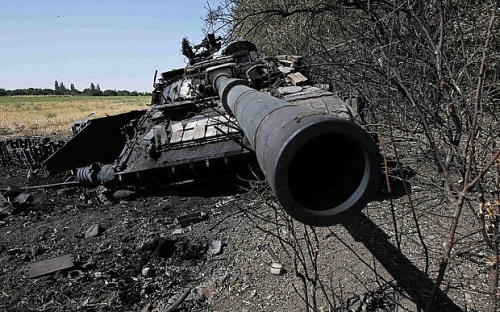
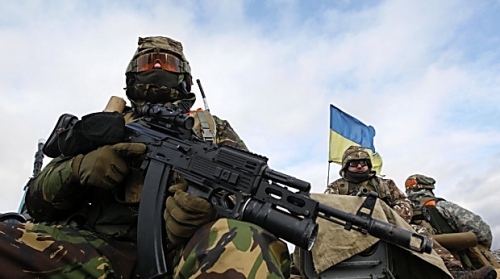
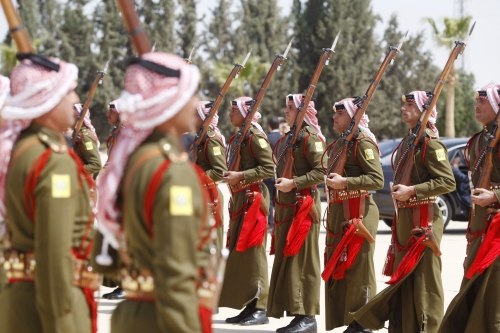

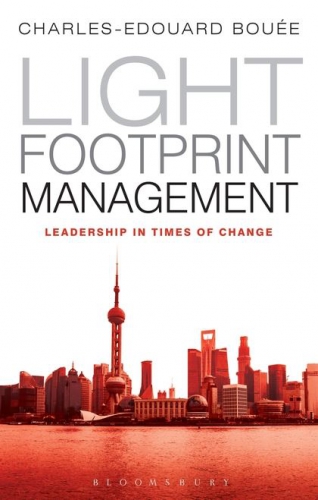 Le président de la Fédération de Russie, Vladimir Poutine, a dénoncé, lors de sa conférence de presse annuelle, jeudi, les visées impérialistes de l'Occident et ses pratiques hégémoniques. «Nos partenaires ont décidé qu'ils étaient les vainqueurs, qu'ils étaient désormais un empire et que les autres étaient des vassaux qu'il faut faire marcher au pas», a-t-il fustigé. Il a accusé les Occidentaux, Etats-Unis en tête, de vouloir «arracher les crocs et les griffes de l'ours russe». 25 ans après la chute du mur de Berlin, ils dressent, selon lui, un nouveau mur entre la Russie et l'Europe. «Il s'agit d'un mur virtuel, mais il commence déjà à être construit», a déclaré le chef de l'État, rappelant l'élargissement de l'Otan jusqu'aux portes de la Russie (pays baltes) et le bouclier antimissile en Europe orientale.
Le président de la Fédération de Russie, Vladimir Poutine, a dénoncé, lors de sa conférence de presse annuelle, jeudi, les visées impérialistes de l'Occident et ses pratiques hégémoniques. «Nos partenaires ont décidé qu'ils étaient les vainqueurs, qu'ils étaient désormais un empire et que les autres étaient des vassaux qu'il faut faire marcher au pas», a-t-il fustigé. Il a accusé les Occidentaux, Etats-Unis en tête, de vouloir «arracher les crocs et les griffes de l'ours russe». 25 ans après la chute du mur de Berlin, ils dressent, selon lui, un nouveau mur entre la Russie et l'Europe. «Il s'agit d'un mur virtuel, mais il commence déjà à être construit», a déclaré le chef de l'État, rappelant l'élargissement de l'Otan jusqu'aux portes de la Russie (pays baltes) et le bouclier antimissile en Europe orientale.

 «
« «Una persona che parlava di tutto e di tutti, sino al limite del pettegolezzo e raccontando barzellette, come un vecchio amico, senza prosopopea e saccenteria o atteggiamenti da ”guru”. Almeno con me non aveva alcuna cadenza o inflessione “alla romana”, pur essendo nato e cresciuto nella capitale con qualche viaggio da ragazzino a Cinisi, il paese di origine dei suoi dove ancora esiste la casa avita. Al massimo arrotava “alla siciliana” la “r” iniziale delle parole essendo vissuto in una famiglia di quelle origini. Insomma, tutt’altro che il personaggio che emerge da altri ricordi. Ad esempio, un amico, che “evoliano” non è, mi ha raccontato che andando a trovarlo insieme ad un devoto del suo pensiero, questi, entrato nella sua stanza, si prosternò al suolo e quindi assorbì in silenzio i precetti un po’ assurdi e fuori del tempo che Evola gli dettava! Non posso pensare che questo amico si sia inventato tutto. Viceversa, una volta ad altri che erano recati da lui con spirito troppo superficiale, alla fine li congedò, come ha ricordato Renato Del Ponte, regalando oro una copia di Tex, il fumetto western allora (e oggi) il più longevo e diffuso, come dire, secondo me: siete più adatti a questo genere di letture. A buon intenditor…».
«Una persona che parlava di tutto e di tutti, sino al limite del pettegolezzo e raccontando barzellette, come un vecchio amico, senza prosopopea e saccenteria o atteggiamenti da ”guru”. Almeno con me non aveva alcuna cadenza o inflessione “alla romana”, pur essendo nato e cresciuto nella capitale con qualche viaggio da ragazzino a Cinisi, il paese di origine dei suoi dove ancora esiste la casa avita. Al massimo arrotava “alla siciliana” la “r” iniziale delle parole essendo vissuto in una famiglia di quelle origini. Insomma, tutt’altro che il personaggio che emerge da altri ricordi. Ad esempio, un amico, che “evoliano” non è, mi ha raccontato che andando a trovarlo insieme ad un devoto del suo pensiero, questi, entrato nella sua stanza, si prosternò al suolo e quindi assorbì in silenzio i precetti un po’ assurdi e fuori del tempo che Evola gli dettava! Non posso pensare che questo amico si sia inventato tutto. Viceversa, una volta ad altri che erano recati da lui con spirito troppo superficiale, alla fine li congedò, come ha ricordato Renato Del Ponte, regalando oro una copia di Tex, il fumetto western allora (e oggi) il più longevo e diffuso, come dire, secondo me: siete più adatti a questo genere di letture. A buon intenditor…».